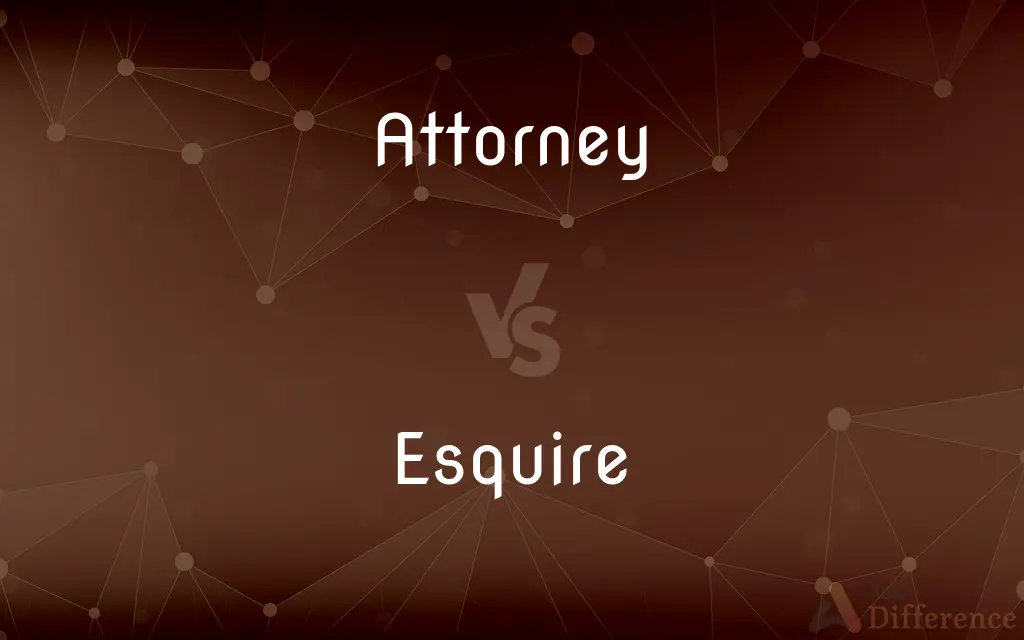Attorney vs. Esquire — What's the Difference?
By Tayyaba Rehman & Fiza Rafique — Updated on March 17, 2024
An attorney is a legal professional who represents and advises clients, while an esquire, often a title for attorneys, denotes a higher social status or professional standing.

Difference Between Attorney and Esquire
Table of Contents
ADVERTISEMENT
Key Differences
An attorney is licensed to practice law and can represent clients in legal matters. They can provide legal advice, draft legal documents, and appear in court on behalf of their clients. On the other hand, esquire is a title often used after a lawyer's name, particularly in the United States, to denote their professional and social standing as a licensed attorney.
While all attorneys can practice law, the term "esquire" is more of a courtesy title and does not confer any additional legal qualifications or abilities. Whereas "attorney" focuses on the professional role, "esquire" emphasizes the respect and status associated with being a member of the legal profession.
The use of "attorney" is more prevalent when referring to the legal profession and its functions, including legal representation and advice. In contrast, "esquire" is less about the role and more about the honorific associated with the legal profession, often seen in formal settings or written communications.
In terms of qualifications, becoming an attorney requires a law degree and passing the bar examination in the relevant jurisdiction. On the other hand, "esquire" does not require separate qualifications; it is a title that can be used by attorneys as a sign of their professional status.
Despite their differences, both terms are integral to the legal profession. "Attorney" highlights the functional aspect of practicing law, while "esquire" reflects the esteem and tradition within the legal community.
ADVERTISEMENT
Comparison Chart
Definition
A legal professional licensed to practice law
A courtesy title used after a lawyer's name
Function
Represents and advises clients in legal matters
Denotes professional standing or social status
Qualifications
Requires a law degree and passing the bar exam
No separate qualifications; used by licensed attorneys
Usage
Commonly used to refer to legal professionals
Used as an honorific in formal or written communications
Focus
On legal practice and representation
On social status and respect within the legal profession
Compare with Definitions
Attorney
An attorney acts as a legal representative for clients in court.
The attorney presented the evidence to the jury.
Esquire
Used as a title by attorneys, indicating professional status.
Jane Doe, Esquire, was recognized at the legal conference.
Attorney
Negotiates settlements and agreements.
The attorney negotiated a favorable settlement for his client.
Esquire
Used in formal or written communications.
The letter was addressed to John Smith, Esquire.
Attorney
Drafts legal documents and contracts.
The attorney drafted a will that outlined the client's wishes.
Esquire
Indicates respect within the legal profession.
As an esquire, he was held in high regard by his peers.
Attorney
Provides legal advice to clients.
The attorney advised her client on the contract terms.
Esquire
Acts as a status symbol among attorneys.
Being referred to as Esquire was a milestone in her legal career.
Attorney
Defends the legal rights of clients.
The attorney defended the client's rights in the courtroom.
Esquire
Upholds legal tradition and honor.
Using Esquire is a nod to legal tradition.
Attorney
A person who is legally qualified and licensed to represent a person in a legal matter, such as a transaction or lawsuit.
Esquire
Esquire (, US also ; abbreviated Esq.) is usually a courtesy title. In the United Kingdom, Esquire historically was a title of respect accorded to men of higher social rank, particularly members of the landed gentry above the rank of gentleman and below the rank of knight.
Attorney
(US) A lawyer; one who advises or represents others in legal matters as a profession.
Esquire
A polite title appended to a man's name when no other title is used, typically in the address of a letter or other documents
J. C. Pearson Esquire
Attorney
One such who practised in the courts of the common law.
Esquire
A young nobleman who, in training for knighthood, acted as an attendant to a knight.
Attorney
A solicitor.
Esquire
A man or boy who is a member of the gentry in England ranking directly below a knight.
Attorney
An agent or representative authorized to act on someone else's behalf.
Esquire
Abbr. Esq. Used as an honorific usually in its abbreviated form, especially after the name of an attorney or a consular officer
Jane Doe, Esq.
John Doe, Esq.
Attorney
An honorific given to lawyers and notaries public, or those holders by profession who also do other jobs. Usually capitalized or abbreviated as Atty.
Esquire
Chiefly British A barrister-at-law.
Attorney
Clusia spp.
Esquire
In medieval times, a candidate for knighthood who served a knight as an attendant and a shield bearer.
Attorney
A prosecutor
Esquire
(Archaic) An English country gentleman; a squire.
Attorney
To work as a legal attorney.
Esquire
A lawyer.
Attorney
To provide with a legal attorney.
Esquire
A male member of the gentry ranking below a knight.
Attorney
A substitute; a proxy; an agent.
And will have no attorney but myself.
Esquire
An honorific sometimes placed after a man's name.
Attorney
One who is legally appointed by another to transact any business for him; an attorney in fact.
Esquire
A gentleman who attends or escorts a lady in public.
Attorney
To perform by proxy; to employ as a proxy.
Esquire
(archaic) A squire; a youth who in the hopes of becoming a knight attended upon a knight
Attorney
A professional person authorized to practice law; conducts lawsuits or gives legal advice
Esquire
(obsolete) A shield-bearer, but also applied to other attendants.
Esquire
(heraldry) A bearing somewhat resembling a gyron, but extending across the field so that the point touches the opposite edge of the escutcheon.
Esquire
To attend, wait on, escort.
Esquire
Originally, a shield-bearer or armor-bearer, an attendant on a knight; in modern times, a title of dignity next in degree below knight and above gentleman; also, a title of office and courtesy; - often shortened to squire.
Esquire
To wait on as an esquire or attendant in public; to attend.
Esquire
(Middle Ages) an attendant and shield bearer to a knight; a candidate for knighthood
Esquire
A title of respect for a member of the English gentry ranking just below a knight; placed after the name
Common Curiosities
Is there a difference in the legal abilities of an attorney and someone who uses "Esquire"?
No, "Esquire" is a title and does not affect an attorney's legal abilities or qualifications.
Can anyone use the title "Esquire"?
No, typically only licensed attorneys use the title "Esquire" after their names.
Is "Esquire" used outside of the legal profession?
While it's primarily associated with the legal profession, historical usage has seen "Esquire" used in non-legal contexts to denote a gentleman of higher social status.
Can someone be an attorney without ever going to court?
Yes, many attorneys specialize in areas that do not require court appearances, such as transactional law.
Is "Esquire" a legal title?
"Esquire" is not a legal title but a form of address that denotes status within the legal profession.
Can an attorney practice law in any state?
Attorneys must be licensed in the state where they intend to practice, and laws vary by state.
Are there any alternatives to the title "Esquire"?
In formal settings, attorneys might simply be referred to by their professional title, such as "Attorney [Last Name]," without the use of "Esquire."
Do you have to be an attorney to use "Esquire"?
Typically, yes. "Esquire" is a title reserved for those who have been admitted to the practice of law.
Can women attorneys use "Esquire"?
Yes, women attorneys can and do use the title "Esquire" in the same way as men.
Do all attorneys use the title "Esquire"?
Not all attorneys choose to use the title "Esquire," as it's a matter of personal or regional preference.
Is the term "attorney" used internationally?
Yes, "attorney" is used internationally but might have slightly different implications in different legal systems.
Can "Esquire" be used before an attorney's name?
Traditionally, "Esquire" is used after the attorney's name, not before.
Is the use of "Esquire" common in all parts of the United States?
The use of "Esquire" can vary regionally and is more common in some parts of the United States than others.
Can the use of "Esquire" vary depending on the context?
Yes, the appropriateness of using "Esquire" can depend on the context, such as the formality of the communication or the preferences of the individual attorney.
How do you become an attorney?
To become an attorney, one must usually obtain a law degree and pass the bar examination in the relevant jurisdiction.
Share Your Discovery

Previous Comparison
Ewe vs. Sheep
Next Comparison
Sneakers vs. ShoesAuthor Spotlight
Written by
Tayyaba RehmanTayyaba Rehman is a distinguished writer, currently serving as a primary contributor to askdifference.com. As a researcher in semantics and etymology, Tayyaba's passion for the complexity of languages and their distinctions has found a perfect home on the platform. Tayyaba delves into the intricacies of language, distinguishing between commonly confused words and phrases, thereby providing clarity for readers worldwide.
Co-written by
Fiza RafiqueFiza Rafique is a skilled content writer at AskDifference.com, where she meticulously refines and enhances written pieces. Drawing from her vast editorial expertise, Fiza ensures clarity, accuracy, and precision in every article. Passionate about language, she continually seeks to elevate the quality of content for readers worldwide.














































